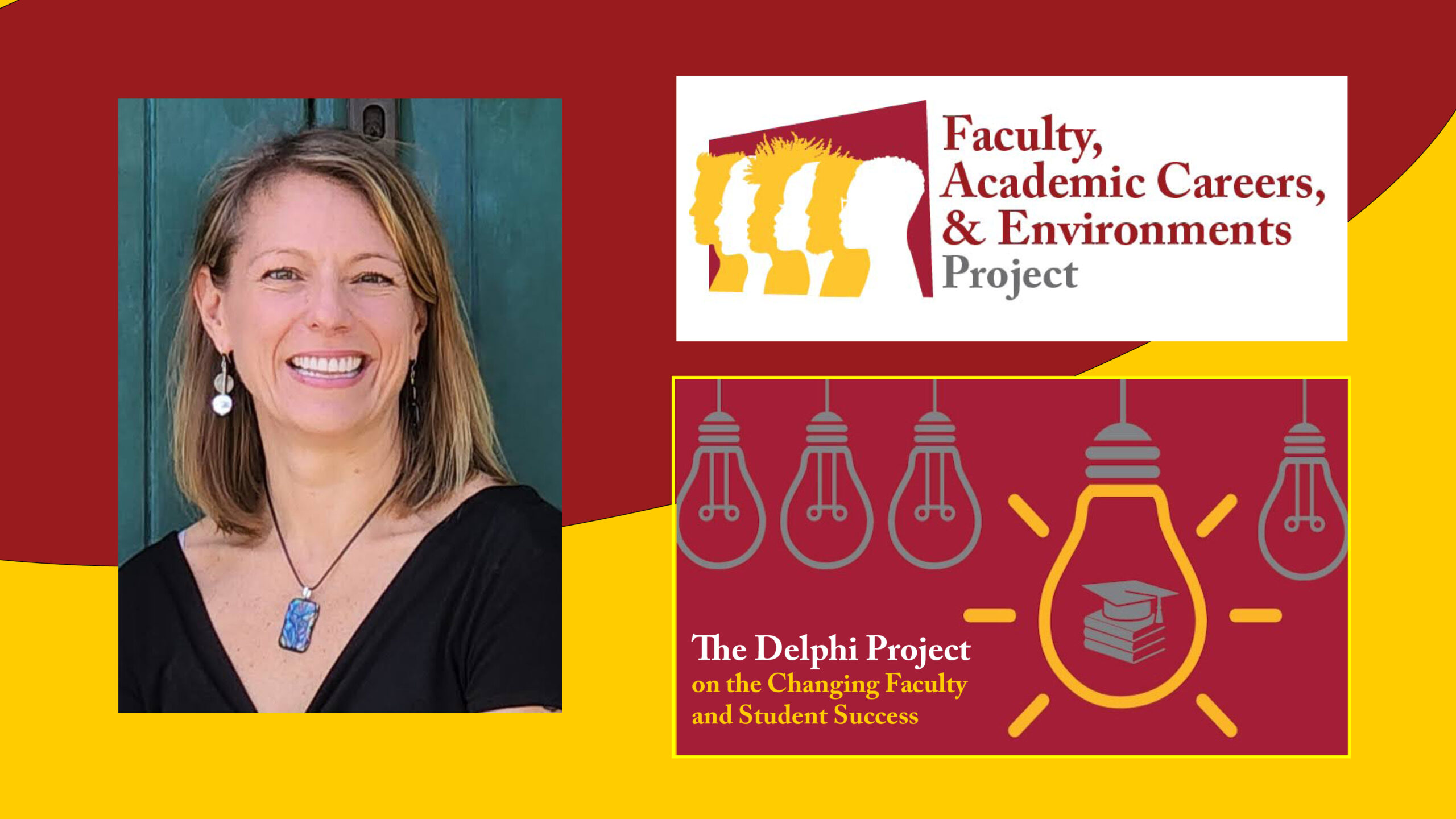The Pullias Center recently named KC Culver as the Associate Director of the Delphi Project on the Changing Faculty and Student Success. Culver, currently an Assistant Professor of Higher Education Administration at the University of Alabama, also serves as the Co-PI on the Faculty, Academic Careers and Environments (FACE) Project, which is part of the Delphi Project. Here, KC shares her thoughts on ‘VITAL’ faculty, the impact the Delphi Project has on institutions and faculty, and why the FACE Project is a dream come true for her.
Q: Your academic work has long focused on equity in higher education, with a specific focus on helping universities and colleges develop systems that create equity for their contingent or non-tenure-track faculty. What is it about this work that you feel passionate about?
I began my career as a VITAL faculty member — VITAL is an acronym for Visiting, Instructors, Temporary, Adjuncts and Lecturers — so I have experienced firsthand some of the ways that VITAL faculty are commonly marginalized in academia: being excluded from shared governance, not being eligible for teaching awards and professional development opportunities, getting “last pick” of classrooms despite teaching four courses a semester, having to pick up additional work to earn a living wage, and waiting anxiously every year to make sure my contract would be renewed.
In the 11 years I held a VITAL faculty role, my labor was essential to the institution’s success: I taught nearly 1,000 undergraduates, many of them first-year students; I served as an administrator in the Writing Center; I developed and led a summer institute for faculty; I managed an undergraduate-run journal; and I served as an academic advisor for undeclared undergraduates.
Institutional leaders may not be aware of all of the ways in which VITAL faculty are told — explicitly and implicitly — that they are not valued, that their voice doesn’t matter. Leaders also may not understand all of the ways that their VITAL faculty contribute to student success. So I am passionate about giving leaders the tools they need to assess the situation on their campus and to facilitate changes that increase support and equity for VITAL faculty.
Q: You were recently named as the Associate Director of the Delphi Project on the Changing Faculty and Student Success, after working with Adrianna Kezar on it for a few years. What do you feel has been the most meaningful outcome from your work on Delphi?
A few years ago, I adopted the phrase “’and,’ not ‘or,’” so rather than choosing one outcome, I’d like to talk about the meaningfulness of partnerships as the foundation for the Delphi Project, thanks to Adrianna’s leadership. With the Delphi Award, which is given to two organizations each year for their efforts to increase equity for VITAL faculty on their campus, the process of selecting and recognizing winners is made more meaningful through partnerships with the TIAA Institute, AAC&U and a member of the VITAL faculty community. Every year, I look forward to the meeting where we discuss the incredible work being done at different campuses. The winning organizations are also recognized at the AAC&U annual meeting, which gives them greater exposure among institutional leaders; this is just one way thats AAC&U has been a meaningful partner in the Delphi Project since the beginning.
Partnerships are also central to the research we have conducted using a scholar-practitioner model. For instance, through an action research project funded by the National Science Foundation, we have partnered with campuses across the country to improve opportunities for VITAL faculty to participate in sustained professional development programs such as faculty learning communities. The POD Network, the professional association for educational developers, was an invaluable partner in helping us identify campuses that wanted to participate.
Another meaningful aspect of the research-practice model is the commitment to publishing case studies, reports and toolkits that share what we learn — getting that information to leaders and practitioners quickly and free of charge. I recently counted, and Delphi Project resources have been downloaded nearly a million times from the Pullias Center’s website since the Project’s inception 11 years ago. That’s so impressive to me. And it wouldn’t be possible without the capacity and reach of the Pullias Center for Higher Education. In fact, in the next six months, we will be publishing several additional case studies and reports based on our findings from the action research project I mentioned.
Q: Tell us more about the Faculty, Academic Careers and Environments (FACE) project, which, through a national survey, aims to capture a wide and accurate picture of who faculty are, what their academic careers look like, and how the environments in which they work shape their ability to thrive as instructors, researchers and/or public scholars in the community.
In January of 2021, Adrianna asked me if I had research project ideas related to the Delphi Project, and I told her that my dream project was to revive the National Study of Postsecondary Faculty. NSOPF was the only source of nationally-representative data about faculty’s careers and experiences, and the last time the study was conducted was 2004. Adrianna quickly championed the idea, so we put together a stellar group of collaborators and advisors to develop a proposal for the pilot project that was funded by NSF’s STEM Education Core Research program. So the FACE Project is — quite literally— a dream come true.
Over the past year, the FACE team has engaged in a deeply thoughtful and intentional process to design the research methods for FACE, which involves data collection at both the institutional level and the individual faculty level. We conducted a census of existing faculty studies and used our learning to design a faculty survey that is inclusive of faculty with very different roles and responsibilities, including VITAL research faculty and part-time teaching faculty, two groups who are often left out of the conversation. The faculty survey asks about many of the most pressing issues related to the changing faculty, especially related to how faculty’s working conditions shape their opportunities to be successful. We also conducted focus groups with institutional data providers, including human resources professionals and institutional researchers, to inform institutional data collection.
Late this spring, we conducted a field test of our processes and instruments, and we’re in the process of evaluating the results with the goal of conducting the study at scale in 2025.
Q: After threeyears as a postdoctoral scholar with the Pullias Center, you’ve just started your second year as a tenure-track assistant professor in higher education administration with the University of Alabama. Now that you’re on the yourself, how has this changed your approach to your work with the Delphi Project and the FACE project?
One of the great things about my current position is that I get to contribute my scholarly expertise on faculty in different contexts. This year, I’m working with a doctoral student in the Higher Education Administration program who is also a McNair Scholar; she is very interested in the mental health and wellbeing of faculty with diverse identities and abilities. Relatively few scholars in higher education study faculty, so I recognize the importance of this opportunity — for both of us — to work together and learn from each other. The University of Alabama has also just started the process of developing promotion tracks for renewable contract faculty, so of course I reached out to the Associate Provost for Faculty Affairs to share the many resources related to new faculty models that are available on the Delphi Project website. In addition to being able to integrate my Delphi Project work in new ways, I see my tenure-track position as an opportunity to continue my advocacy for VITAL faculty and support institutional change from a position that is more secure and more well-respected. This is an unfortunate truth, one that strengthens my commitment to erasing these differences by increasing equity and inclusion of VITAL faculty through my role on the Delphi Project








